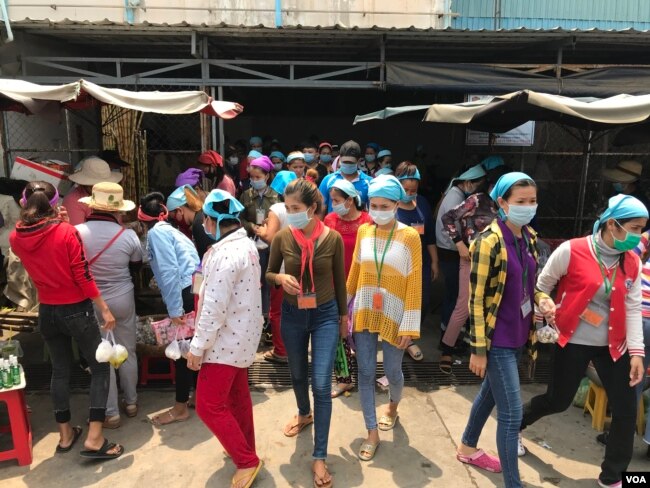After Acleda Bank, Microfinance Group Challenges Civil Society Report on Indebtedness
PHNOM PENH —
The Cambodia Microfinance Association hit back at a civil society report from last month that highlighted the high levels of indebtedness among surveyed garment factory workers, with the industry group calling into question the survey’s findings and methodology.
In late June, rights groups Licadho and Central, and pro-worker union Cambodian Alliance of Trade Unions (CATU) issued a report revealing a high level of indebtedness among surveyed garment workers, which was resulting in them eating less, selling their land or taking additional loans to repay debt.
On Monday, the Cambodia Microfinance Association (CMA) issued a statement contesting the findings of the report, questioning the three civil society groups’ “real intentions” behind publishing the document.
It also questioned the sample size of the report, which was 162 garment workers from three factories, as well as calling the report “biased” and “insufficient” in the information provided.
“The methodology of the survey lacks scientific basis, is biased, lacks knowledge of MFIs and there is insufficient information for verification,” reads the statement.
The report, the statement said, also didn’t point out the interviewee’s credit amount and whether the garment workers had other sources of income besides their factory minimum wage.
The CMA said that its members evaluated a client’s capacity to repay a loan and were aware of the risks before approving the debt. The statement did not provide any specific evidence to suggest or show that the survey was wrong or conducted in bad faith.
Kaing Tongngy, a spokesperson for the Cambodian Microfinance Association, questioned the reality presented by the three rights groups, pointing to allegations the industry body had made against Licadho for a prior report linking migration and microfinance debt.
“We question their methods and their real intention,” he said. “[CATU] is a union, so it is hard for us to accept their selection of workers and we also questioned the credibility of the report.”
On July 2, Acleda Bank, one of Cambodia’s big commercial banks and recently listed on the Cambodia Securities Exchange, also criticized the report in a statement that said the NGO was curtailing “the rights, freedoms, honor and dignity” of the Cambodian people.
The bank questioned the research findings, saying it was baseless and not professional and called for the authorities to take action against anyone inciting persons or groups that deal with financial institutions.
On July 6, the CMA had challenged an earlier Licadho report and video released in May, highlighting a link between indebtedness and migration, in a sample village. The CMA found the village, which was not identified in the Licadho report to protect the respondents’ identities, and claimed that the rights groups had misrepresented the cases of two of the four people in the group.
Am Sam Ath, the deputy director for rights monitoring at Licadho, said that the 162 workers in the survey did not represent all garment workers, but the findings should be used by the relevant organizations and institutions to find “suitable solutions” for the workers.
“We have the right methodology in the survey. We did not just identify and select them [without methodology],” he said.
The CMA statement from Monday also alleged that the rights groups conducted the survey during the COVID-19 pandemic, which had affected incomes and that using this period of time to conduct the survey revealed their “bad intentions.”
The two NGOs and one union had addressed this in their June report. “The experiences of these 162 people are not representative of every garment worker or microloan borrower in Cambodia,” reads the report. “But we know their struggles are shared by some of the other 2.6 million microloan borrowers in Cambodia, who together held more than $10 billion in microloans at the end of 2019.”
Khun Tharo, a program coordinator at labor rights group Central, said on Monday that the pool of workers surveyed was from factories that were completely or partially suspended, in order to highlight the reality faced by workers affected by the pandemic.
“It is not an inciting report. The report reflects reality during the COVID-19 pandemic, where garment workers have lost their income,” he said.
In the Licadho, Central and CATU report, almost all of the 162 respondents said they were indebted and had to eat less food, take another loan, or sell their land to repay their debts.
Ninety-six percent of respondents said debt had made their lives “much worse” or “slightly worse,” with only two percent saying it had improved their situation. The most common reason to take a loan from an MFI or bank was to repay an existing loan, with 73 respondents saying their existing debt liabilities were being paid with new debt.
Source: VOA
This post is also available in: Khmer




